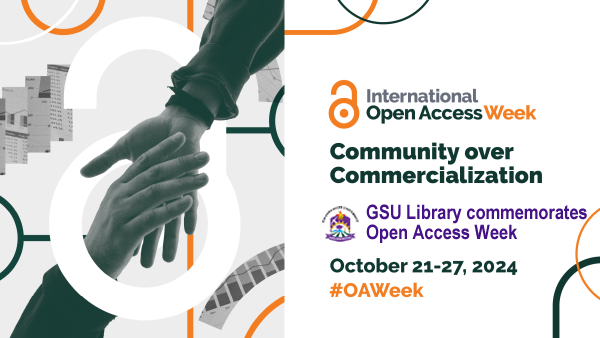Gwanda State University Library Joined the World in celebrating International Open Access Week which was scheduled for the 21st of October 2024 through to 27 October 2024 under the theme Community Over Commercialization.

GSU Library in collaboration with Zimbabwe Open University (ZOU) Library hosted a Webinar on the 23rd of October 2024, under the Theme: Community Over Commercialization. The GSU Deputy Librarian, Mr. Phillip Ndhlovu presented on an interesting topic 'Leveraging Rights Retention Strategy (RRS) and Creative Commons (CC) Licenses'. The webinar attracted a pool of participants who included academics, researchers, and librarians from various institutions.
In the speaker’s discussion, he indicated that a Rights Retention Strategy (RRS) focuses on ensuring that authors maintain control over their intellectual property while promoting broader accessibility to their work. This approach allows researchers to retain certain rights to their publications, enabling them to share their findings freely, whether through institutional repositories or personal websites. By balancing the interests of authors, publishers, and the academic community, rights retention strategies help foster a more transparent and equitable dissemination of knowledge, ultimately enhancing the visibility and impact of research.
Under the topic Creative Commons (CC) licenses, the speaker highlighted that these are a set of public licenses designed to facilitate the sharing and use of creative works. The most common licenses highlighted being CC BY (Attribution); CC BY-SA (Attribution-ShareAlike; CC BY-ND (Attribution-NoDerivatives; CC BY-NC (Attribution-NonCommercial); CC BY-NC-SA (Attribution-NonCommercial-ShareAlike and CC BY-NC-ND (Attribution-NonCommercial-NoDerivatives.
The speaker indicated that Creative Commons licenses play a crucial role in the open access movement by providing a flexible framework for authors to share their work while retaining specific rights. These licenses allow creators to dictate how their content can be used, modified, and distributed by others, promoting collaboration and innovation. By offering various licensing options, such as Attribution (CC BY) or NonCommercial (CC NC), Creative Commons empowers researchers and artists to contribute to the global knowledge pool while ensuring their work is accessible and easily discoverable. This fosters a culture of sharing and enhances the visibility of scholarly research and creative outputs.
